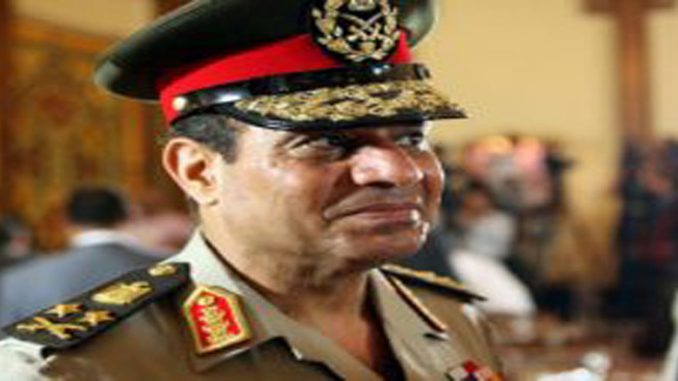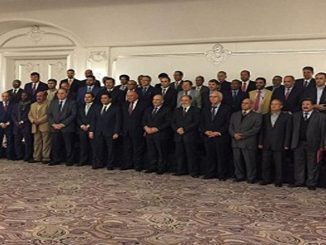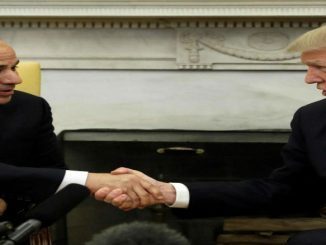
Mahmoud Al-Sisi, the son of Egypt’s Abdel Fattah Al-Sisi, has been holding marathon meetings within the General Intelligence Service (GIS) while seeking to extend his father’s presidency, the New York Times has reported.
The GIS is one of Egypt’s three major security services; Mahmoud Al-Sisi occupies a senior position and has been holding the meetings almost daily under the supervision of the agency’s head Abbas Kamel.
According to Mada Masr, Kamel has attended some of the meetings. The intention has been to finalize the constitutional amendments approved by parliament recently and the date of the referendum through which they will be passed into law.
The amendments would enable Al-Sisi Senior to remain President until 2034. The NYT has pointed out that he will have the power to appoint judges and the country’s prosecutor general, while the top echelon of the judiciary would be stripped of its authority to vet draft legislation.
The amendments also state that the military is the “guardian and protector” of Egypt’s Constitution and would control the appointment of the Defence Minister.
At least ten Egyptian human rights groups have warned that the proposed changes to the constitution would enable the President of the Republic to monopolize the position as long as he lives. The NYT has described this as “unprecedented authoritarian rule.”
However, the NYT added that Al-Sisi Senior has pledged not to remain in office against the will of people. “It doesn’t suit me as President to stay one more day against the will of the Egyptians,” he told CNBC in 2017. “We will not interfere with (the constitution). I am all for keeping the limit to two four-year terms.”
While al-Sisi’s supporters claim that he would remain in office in order to have enough time to implement his economic plans and bring security and stability to the country, however, it appears that the Egyptians are facing the prospect of another authoritarian military regime.
Critics also say that it appears that Egypt is facing the prospect of a dynastic regime. While working to consolidate his father’s rule, Mahmoud Al-Sisi might well be working to pave the way for his own presidency.
Egypt’s Move Towards Authoritarian Military Rule
According to the Human Rights Watch,” the amendments, introduced in Egypt’s parliament on February 3, 2019, would make the military “responsible for protecting the constitution and democracy … and the civil state,” effectively granting the army governing authority.
A parliamentary committee quickly agreed to discuss the proposed amendments, only three days after they were proposed.
It is Egypt’s parliament is dominated by supporters of Abdel Fattah al-Sisi, with almost no opposition.
Article 140 of the proposed revised constitution would extend presidential terms from four years to six. The draft clause would also add a “transitional article” that would allow the current president, after finishing his term, to run for two more terms.
In addition, the amendments could further undermine judicial independence by giving al-Sisi tighter control over appointing senior judges and largely remove the State Council judges’ authority to revise legislation before it becomes law.
The amendments could also grant wider jurisdiction for military courts to try civilians. In the last three years, over 15,000 civilians, including children, have been referred for military prosecution.
“These amendments reinforce efforts of al-Sisi’s military-backed government to stifle people’s ability to challenge those in power,” said Michael Page, deputy Middle East and North Africa director at Human Rights Watch. “If the amendments are passed, there is a clear risk that they will formally give the armed forces unchecked authority.”
Popular anger over the authoritarian regime of Hosni Mubarak helped to fuel Egypt’s 2011 Revolution, but still corruption remains a serious problem in Egypt today, says a new report from the Project on Middle East Democracy.
Abdel Fattah al-Sisi, a strongman from the military, has declared that a “comprehensive” effort to eliminate government corruption is one of his priorities. In reality, al-Sisi’s so-called anti-corruption policies have been extremely narrow and motivated by darker concerns.
To “fight corruption” al-Sisi mainly has relied upon a powerful state agency that reports directly to him, the Administrative Control Authority (ACA). The ACA’s main official role is to gather information on administrative and financial violations in the state apparatus and to refer cases to prosecutors when wrongdoing is suspected, notes Fighting Corruption or Protecting the Regime? Egypt’s Administration Control Authority, a report from Jessica Noll.
This report explains the role of the ACA as an instrument of power in al-Sisi’s regime, part of a wider system of repression and control. The report discusses how authoritarian rulers use corruption and anti-corruption campaigns to maintain their grip on power.
It describes the ACA’s mandate and authorities, tracing its evolution from its origins under President Gamal Abdel Nasser.
The report then considers the main functions of the ACA under al-Sisi: targeting certain officials for corruption while leaving others untouched, attracting foreign investment needed to deliver the economic turnaround he has promised, and consolidating his power over the state bureaucracy. It also discusses international assistance to the agency.
The report argues that because the ACA does not meet minimum standards of political independence, transparency, and accountability, treating it as the centerpiece of a genuine anti-corruption campaign is misguided and can even be counterproductive.



